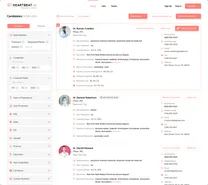Are you a dentist in Connecticut trying to understand the maze of licensure requirements?
Whether you’re applying for the first time or looking to renew your license, navigating the Connecticut Board of Dentistry’s process can seem overwhelming. But with the right guidance, it becomes a manageable journey.
The Connecticut Board of Dentistry is essential in ensuring that dentists maintain high standards of practice, overseeing everything from initial licensure to ongoing educational requirements. It’s their job to make sure all dentists practicing in Connecticut are qualified and up to date with the latest standards.
In this guide, we’ll explore the board’s procedures for renewing licenses, reviewing applications, and verifying credentials. We’ll also explore how Heartbeat AI can help here.
Let’s start!

What’s on this page:
Connecticut Board of Dentistry: At A Glance
The CT Board of Dentistry ensures that the state’s dental professionals meet stringent criteria for safety, ethics, and professional conduct.
The board’s main responsibilities include licensing dentists, dental hygienists, and dental assistants, and verifying that they fulfill the necessary education and training requirements. It also approves dental education programs that meet state and national standards. Moreover, the board enforces dental practice laws, investigates complaints, and takes disciplinary actions against those who violate professional standards.
Contact Information
- Address: Connecticut Department of Public Health, 410 Capitol Avenue, Hartford, CT 06134
- Phone: (860) 509-8000
- Website: Connecticut Board of Dentistry
What is the Connecticut Board of Dentistry Responsible for?
The Connecticut Board of Dentistry is responsible for various functions that uphold the standards and regulations of dental practice within the state, ensuring public safety and professional conduct in dentistry. Here are the key responsibilities of the board:
- Licensing and Certification: The board issues licenses to dentists, dental hygienists, and dental assistants, ensuring that they meet the educational and training requirements necessary for safe and competent practice.
- Regulation Enforcement: It sets and enforces rules and guidelines for dental practices, overseeing professional behavior and adherence to legal standards.
- Educational Oversight: The board approves dental education programs and continuing education courses to ensure they comply with current professional standards and effectively prepare dental professionals for practice.
- Disciplinary Actions: It has the authority to investigate complaints against dental professionals and can take disciplinary measures against those found in violation of state laws or professional ethics, including suspending or revoking licenses.
- Public Protection: The board works to protect the public by ensuring that dental care providers are competent and perform their duties to the required standards. It also provides information and resources to the public about dental healthcare providers and their rights as patients.
- Professional Standards Maintenance: The board updates and maintains standards for practice that align with advances in dental science and changes in healthcare policy.
Connecticut Board of Dentistry Lookup
To check a dentist’s license with the Connecticut Board of Dentistry, you should visit the official website of the Connecticut Department of Public Health. Look for the section dedicated to licensing services, where you’ll find an option for “License Verification.” This feature allows you to search by entering the dentist’s name or license number.
The results from this search will provide critical details about the dentist’s license status, including whether it is currently active, when it expires, and any records of disciplinary actions. Verifying the license of a dentist is essential to ensure that they are properly qualified and adhere to professional standards.
If you need a more user-friendly way to access up-to-date information on dental professionals in Connecticut, platforms like Heartbeat AI offer an efficient alternative. These services streamline the process, helping you quickly verify the credentials of dental care providers.
Connecticut Board of Dentistry License Requirements
To be licensed as a dentist in Connecticut, applicants must meet the following criteria:
- Minimum age of 18.
- Graduation from a CODA-accredited dental school.
- Passing the National Board Dental Examination (NBDE) Parts I and II, or the Integrated National Board Dental Examination (INBDE).
- Successful completion of a state-approved clinical dental examination.
- Submission of a completed application along with the necessary fees to the Connecticut State Dental Commission.
- Undergoing a criminal background check.
- Passing a jurisprudence exam that covers Connecticut dental laws and regulations.
- For dentists trained outside the United States, verification of equivalent training and proof of English proficiency is required.
How to Get a Connecticut Board of Dentistry License
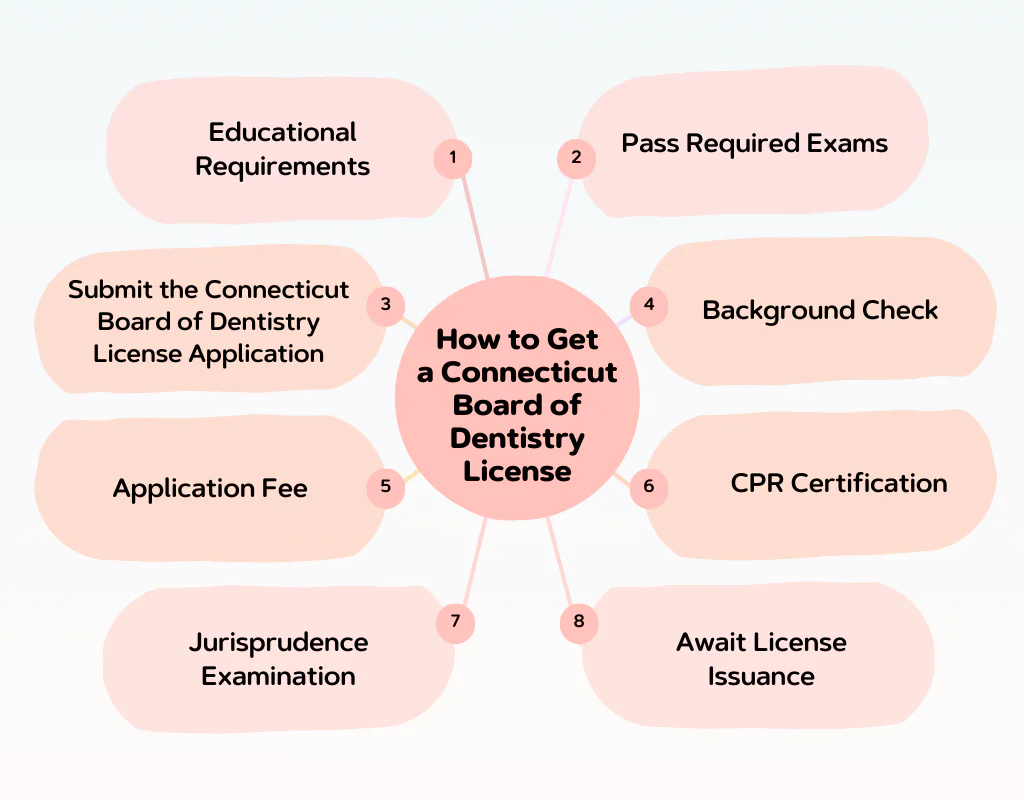
Obtaining a dentistry license in Connecticut involves a structured process to ensure that all practitioners meet the state’s high standards for professional dental care. Here’s a step-by-step guide:
Step 1: Educational Requirements
Start by completing your dental education at a dental school accredited by the Commission on Dental Accreditation (CODA). This step ensures your training adheres to nationally recognized educational standards.
Step 2: Pass Required Exams
You need to successfully pass the following examinations to be eligible for licensure:
- Dentists: Complete both parts of the National Board Dental Examination (NBDE) or the Integrated National Board Dental Examination (INBDE), along with a state-approved clinical dental examination.
- Dental Hygienists and Assistants: Specific examinations customized to each role, focusing on both practical and theoretical knowledge.
Step 3: Submit the Connecticut Board of Dentistry License Application
Complete and submit the licensure application to the Connecticut State Dental Commission. Attach all required documents, including proof of education and examination results, to ensure your application is processed efficiently.
Step 4: Background Check
Undergo a mandatory criminal background check, a crucial step to verify your suitability for professional practice in the dental field.
Step 5: Application Fee
Pay the necessary application fee associated with your licensure process. This fee covers the administrative costs of handling your application.
Step 6: CPR Certification
Provide proof of current CPR certification if it is required for your specific dental role. This certification is essential for managing emergency situations in dental practice.
Step 7: Jurisprudence Examination
Pass the Connecticut dental jurisprudence exam, which covers the state’s specific dental laws and regulations. This ensures that all practitioners are knowledgeable about local standards and legal requirements.
Step 8: Await License Issuance
Once all the above steps are complete and your application has been reviewed and approved by the Connecticut State Dental Commission, your license will be issued. This final step authorizes you to begin practicing dentistry in Connecticut.
Connecticut Dentistry Board Licensure Time Frame
The time frame for obtaining a dental license from the Connecticut State Dental Commission can vary based on several factors. Once you have submitted a complete application with all necessary documentation and fees, the review process starts.
Typically, this process can take from a few weeks to 3-4 months. The duration depends on the completeness of your application, the need for any additional information, and the Dental Commission’s schedule for reviewing applications.
Cost of Connecticut Dentistry Board License
The cost of obtaining and maintaining a dentistry license in Connecticut is outlined by the Connecticut State Dental Commission. The fees are structured to cover various stages of the licensure process, from initial application to renewal and other specific licensure requirements.
For initial licensure, dentists in Connecticut must pay an application fee of $565. This fee is required when submitting the application for licensure and is used to process the application and cover administrative costs. Once licensed, dentists must pay a biennial renewal fee, which is currently set at $575. This renewal fee is essential for maintaining an active license to practice within the state.
In addition to these fees, there are other costs associated with licensure in Connecticut, such as fees for reinstatement if a license lapses, which is also $565. Dental professionals need to be aware of these fees and plan accordingly to ensure continuous licensure without interruption.
Connecticut Board of Dentistry License Renewal
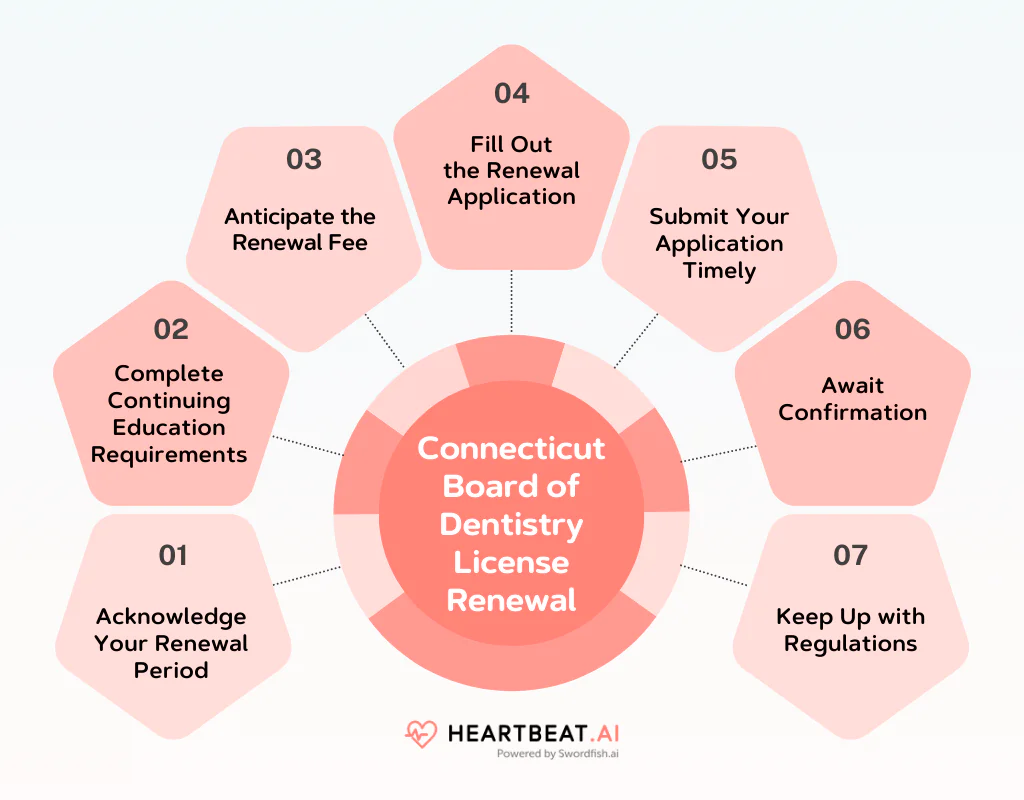
Renewing your dentistry license in Connecticut requires following a series of steps to ensure your practice remains compliant and uninterrupted. Here’s a detailed guide on how to renew your license:
Step 1: Acknowledge Your Renewal Period
Dentistry licenses in Connecticut must be renewed every two years. It’s important to be aware of your license’s expiration date to avoid any lapses in your ability to practice.
Step 2: Complete Continuing Education Requirements
Continuing education (CE) is mandatory for renewing your license. Connecticut requires dentists to complete a specific number of CE hours within each renewal period. The exact requirements and approved CE courses can be found on the Connecticut State Dental Commission’s website.
Step 3: Anticipate the Renewal Fee
Set aside funds for the renewal fee. As of the latest update, the renewal fee for dentists in Connecticut is $575. This fee is subject to change, so it’s advisable to verify the current amount on the official website or by contacting the Commission directly.
Step 4: Fill Out the Renewal Application
The renewal application can typically be completed online through the eLicensing portal provided by the Connecticut Department of Public Health. Make sure all your information is current and accurately reflected in the application.
Step 5: Submit Your Application Timely
To avoid late fees and potential penalties, submit your completed application along with the required renewal fee before your license expires.
Step 6: Await Confirmation
After you submit your application, you can monitor its status online. The Board will inform you when your renewal has been processed, which will extend your licensure for an additional two years.
Step 7: Keep Up with Regulations
Dental practice regulations and CE requirements are subject to change. It’s crucial to regularly check the Connecticut State Dental Commission’s website for the latest updates to ensure you remain in compliance with any new laws and requirements.
Connecticut Board of Dentistry License Verification
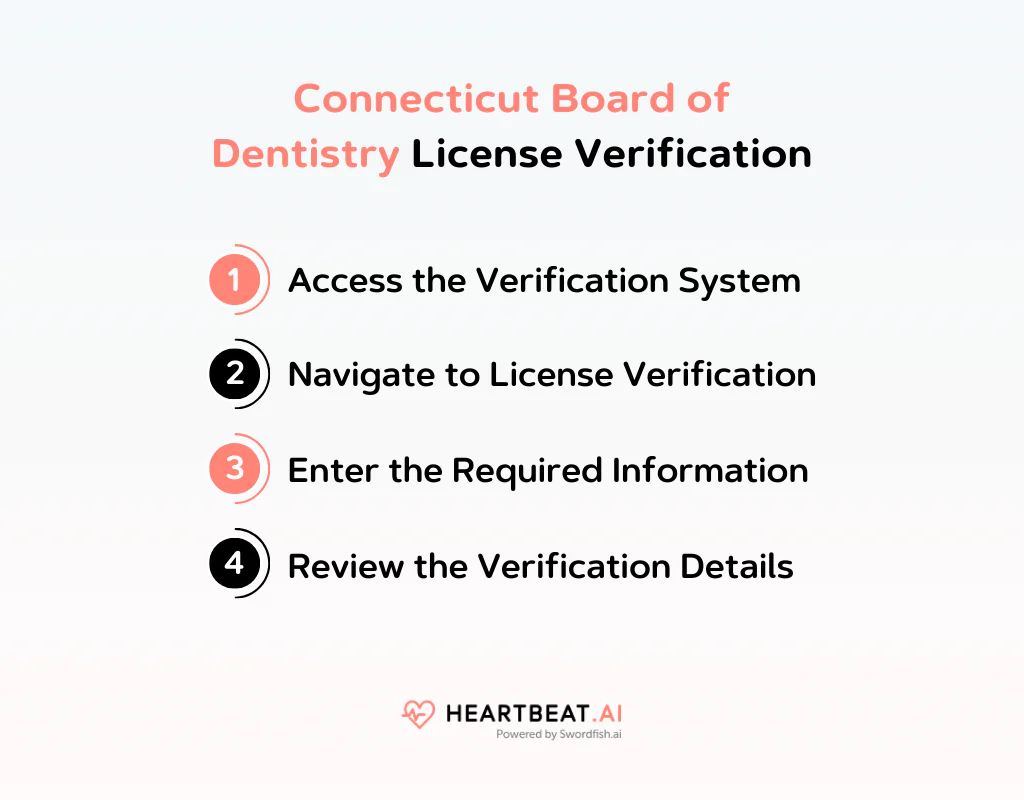
Verifying a dental license in Connecticut is an essential process for ensuring that dental professionals meet state regulations and maintain good standing in their field. Here’s how to do it:
Step 1: Access the Verification System
Start by visiting the official website of the Connecticut Department of Public Health. Navigate to the section dedicated to the State of Connecticut eLicense Website.
Step 2: Navigate to License Verification
Look for a link or section titled “Verify a License” on the eLicense website. This link will take you to the online verification tool, which is designed to help users search for and verify the licenses of healthcare and other professionals regulated by the state.
Step 3: Enter the Required Information
In the verification tool, you will need to enter specific details about the dental professional you wish to verify. You can typically search by the practitioner’s name, license number, or other identifiers. Ensure the information you input is accurate to retrieve the correct details.
Step 4: Review the Verification Details
After submitting your search, the tool will display results that include the dental professional’s license status. This information often covers the license type, the current status (active, expired, suspended, etc.), expiration dates, and sometimes details of any disciplinary actions.
How Often Do Dentistry Licenses Need to be Renewed in Connecticut?
In Connecticut, dentistry licenses need to be renewed annually. The Connecticut State Dental Commission requires that all licensed dental professionals renew their licenses each year to maintain their eligibility to practice. This annual renewal process helps ensure that dentists continue to meet the professional and ethical standards set by the state.
As part of the renewal process, dentists may also be required to fulfill continuing education (CE) requirements. These requirements are designed to ensure that dental professionals stay updated with the latest advancements in dental science and practice, as well as any changes in healthcare regulations.
How Does Heartbeat AI Simplify the Process of Getting & Renewing a Dentistry License in Connecticut?
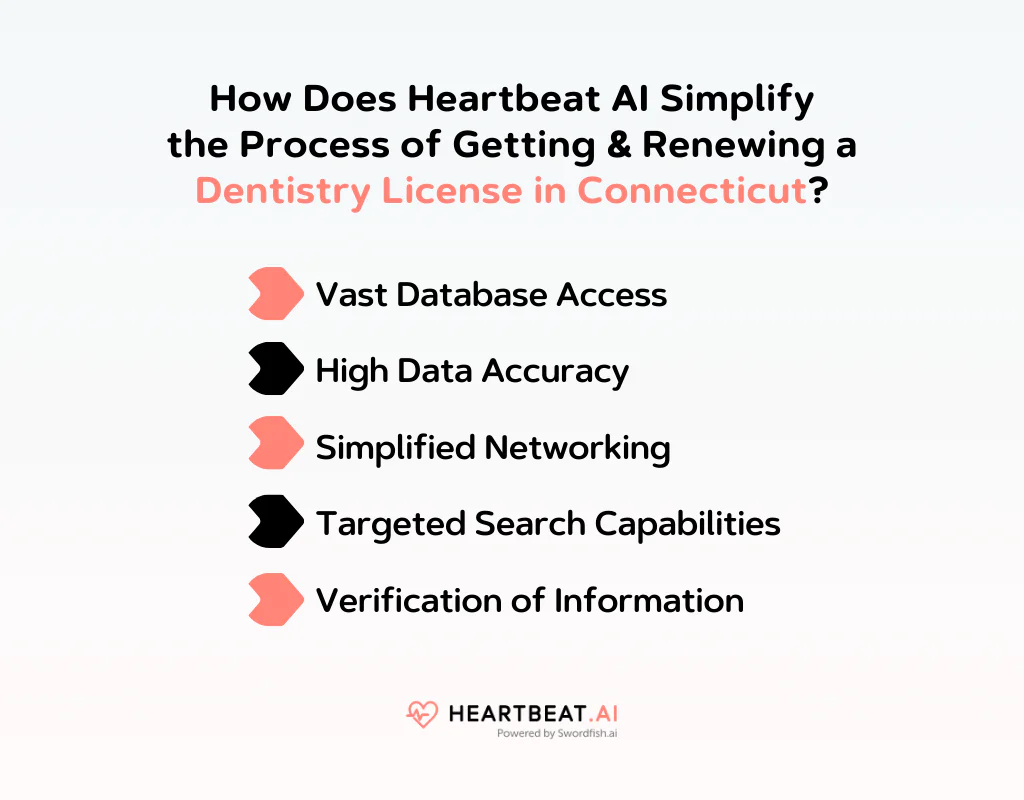
Heartbeat AI significantly streamlines the process of acquiring and renewing a Dentistry license in Connecticut, utilizing its advanced technology and comprehensive database. While the platform does not directly handle licensing services, it provides considerable support to optometrists with a range of helpful features.
Here’s a look at how Heartbeat AI facilitates this process:
Vast Database Access
Heartbeat AI provides access to a large database with over 11 million healthcare professionals, including dentists. This extensive access allows dentists in Connecticut to easily find and contact licensing experts and other relevant professionals.
High Data Accuracy
By utilizing advanced data analysis techniques, Heartbeat AI ensures that the contact details it provides are highly accurate. This accuracy is crucial for effective communication.
Simplified Networking
The Heartbeat AI Chrome Extension facilitates networking by enabling dentists to easily connect with a broad professional network. This feature is invaluable for dentists looking to explore career opportunities, seek professional advice, or simply expand their professional network.
Targeted Search Capabilities
Heartbeat AI’s Prospector Tool allows dentists to conduct searches for healthcare professionals using specific criteria, such as location or specialty. This targeted search capability makes it easier for dentists in Connecticut to find the right contacts quickly.
Verification of Information
The platform also includes a File Upload feature, which helps verify and correct any inaccuracies in contact lists. Ensuring the use of accurate data helps in submitting correct information for licensure applications and renewals.
Conclusion
In summary, we have explored how the Connecticut Board of Dentistry oversees dental practices within the state. Dentists in Connecticut are required to adhere strictly to the board’s regulations to ensure their licenses remain valid and that they continue to provide the highest standards of patient care.
For a more efficient way to locate licensed dental practitioners in Connecticut and access important licensing information, Heartbeat AI offers a valuable resource. This platform facilitates effective networking within the healthcare industry and simplifies licensing-related processes.
FAQs
How can I upgrade my dental assistant registration to a dental hygienist in Connecticut?
To upgrade from a dental assistant to a dental hygienist in Connecticut, you must complete an accredited dental hygiene program. Additionally, you must pass the National Board Dental Hygiene Examination and a regional or state clinical examination.
How can I file a complaint against a dental professional in Connecticut?
To file a complaint against a dental professional in Connecticut, visit the Connecticut Department of Public Health’s website and access the online complaint form. Alternatively, you can submit your complaint in writing, providing details about the dentist, the nature of your complaint, and any relevant evidence to support your claim.
What should I do if my dental license is lost or stolen in Connecticut?
If your dental license is lost or stolen, you should immediately contact the Connecticut Board of Dentistry to report the issue and request a duplicate license. There may be a fee for the issuance of a replacement license.

